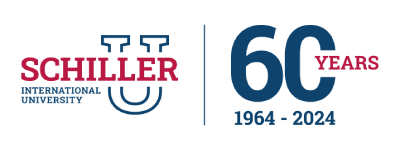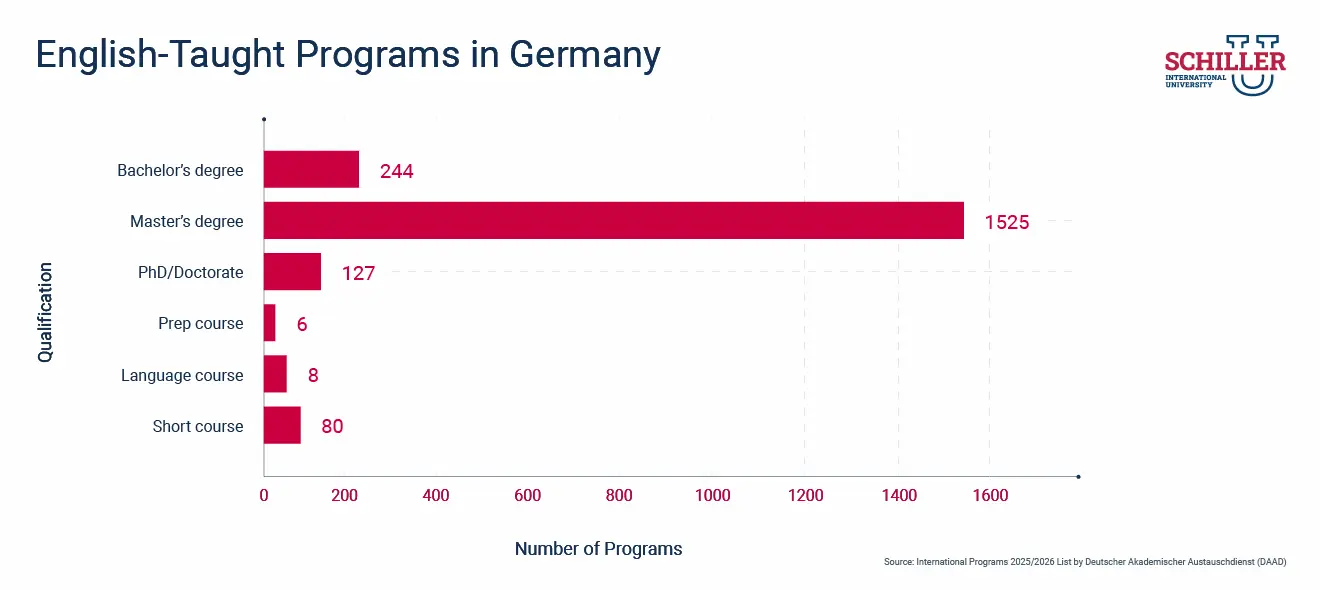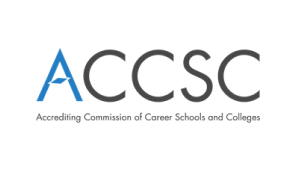When it comes to studying abroad, Germany ranks among the top choices for international students, third in Europe and sixth globally. One major factor is that over half of Germans (about 56%) speak English fluently. Another reason is the growing number of bachelor’s and master’s programs taught in English. Add in generous scholarship opportunities such as the Deutscher Akademischer Austauschdienst (DAAD) or German Academic Exchange Service, and it is clear why students from all over the world are drawn to Germany for higher education.
In recent years, the number of international students choosing to study in Germany in English has surged dramatically. Master’s programs alone have seen nearly a 40% rise in international students over the last five years. The growth reflects Germany’s commitment to accessible, global education. Whether you are planning to pursue a bachelor’s degree in Germany in English or advance your career with a master’s program, Germany offers world-class education, cultural diversity, and outstanding career opportunities, all in an English-speaking academic environment.
Can You Study in Germany in English?
Germany now offers a wide range of programs taught in English at both public and private universities. According to the DAAD (German Academic Exchange Service), there are over 1,984 English-taught programs across the country. These include bachelor’s and master’s degrees, PhDs, preparatory courses, and short courses in fields such as engineering, computer science, mathematics, the natural sciences, public administration, and more.
The rise of English-taught programs shows Germany’s push to welcome students from all over the world. Universities know that many students want a respected German degree without having to master the German language first, so English has become a common language of instruction. You can find these programs easily on the DAAD International Program Database, which lists all accredited English-language degrees in Germany.
English-Taught Bachelor’s Programs in Germany
Germany offers a variety of bachelor’s programs taught in English. This means you can earn a globally recognized degree without the need to learn German first. Over the past decade, English-taught undergraduate programs have grown steadily, especially in fields that are in demand globally for innovation, leadership, and digital skills.
Admission Requirements (Undergraduate Students)
At Schiller International University, international students generally need the following to apply for undergraduate programs:
Eligibility
- Official high school transcript or equivalent (e.g., Abitur, IB, Baccalauréat, A-levels)
- Signed enrollment agreement
English Proficiency (minimum scores)
- TOEFL iBT: 51
- IELTS: 5.5
- Duolingo: 95
- TOEIC: 650
- Cambridge FCE: B (B2)
- Exempt if previous education was in English.
Visa and Financial Requirements (non-EU/EEA students)
- Apply online with a fee at least four months before the term.
- Proof of secondary education and financial support.
- Advance tuition deposit.
Transfer Students
- Official transcripts from prior institutions.
- Evaluated foreign transcripts (if applicable) by accredited agencies (AICE, AACRAO, NACES).
You can find the detailed list of admission requirements here: Schiller Admissions Requirements.
Schiller’s Bachelor programs in Germany (in English)
At Schiller, you can choose from several fully English-taught bachelor’s programs on our Heidelberg campus, a multicultural hub in one of Germany’s most historic university cities. Each program is designed to build global perspectives, critical thinking, and practical skills necessary to pursue international careers. Current bachelor’s programs in Germany (taught in English) include:
- BA in International Relations and Diplomacy
- BS in Computer Science
- BS in International Business
- BS in International Hospitality and Tourism Management
- BS in Business Analytics
- BS in Applied Mathematics and Artificial Intelligence
- BS in International Marketing
English-Taught Master’s Programs in Germany
Germany offers many master’s programs in English for international students who want to advance their careers in business, technology, sustainability, and global studies. These programs mix strong academic training with practical experience, helping you prepare for leadership roles in global industries.
Admission Requirements (Graduate Students)
To apply for English-taught master’s programs at Schiller International University, students must submit documents showing they are ready for graduate-level study. This includes:
Official Undergraduate Transcripts
- From the institution awarding your degree or equivalent.
- If your degree is not US-recognized, an evaluation by an accredited agency (AACRAO, AICE, or NACES) is required (costs covered by the applicant).
Signed Enrollment Agreement and official identification or passport (for visa students).
English Proficiency
Required if post-secondary education was not in English or you haven’t completed 24+ credits in an English-taught program:
- TOEFL iBT: 67
- TOEIC: 700
- IELTS: 6.0 (6.5 for MBA and MBA International Business)
- Cambridge FCE: B (B2) or higher; CAE/CPE preferred
- Duolingo: 105
- Pearson PTE: GSE 52
- Tampa Language Center Level 6 completion is accepted
Student Visa (non-EU/EEA students)
- Documentation proving a bachelor’s degree or equivalent
- Completion of any program-specific prerequisites, if required
- Good academic record from undergraduate studies
Schiller’s Master’s programs (in English)
At Schiller, we offer a variety of master’s programs in English at our Heidelberg campus, designed for international students who want global careers. Each program is flexible and lets you specialize in fields like business, finance, sustainability, diplomacy, data science, and digital marketing.
- Master’s of Business Administration (MBA)
- MA in International Relations and Diplomacy
- MBA in International Business
- MS in Sustainability Management
- MS in Global Finance
- MS in Data Science
- MS in Digital Marketing and E-Commerce
Cost of Studying in Germany
Before applying for your desired English-taught program in Germany, it is important to find out about the prospective tuition fees, scholarship options, and living expenses. This will help you plan your study abroad experience better.
- Tuition fees: Tuition varies depending on the program and university. Fees usually cover classes, university facilities like libraries and labs, student support services, and administrative costs. Keep in mind that most universities do not cover accommodation, food, health insurance, visas, travel, or personal expenses.
- Scholarships and financial aid options: There are many ways to fund your studies. For example:
- DAAD Scholarships - Merit-based funding for bachelor’s, master’s, and PhD students.
- Deutschlandstipendium - A university and industry-sponsored scholarship for students who excel academically.
- Schiller Scholarships - We also offer scholarships to make your education more affordable. Learn more here: Schiller Scholarships.
- Living costs in Germany: Besides tuition, living expenses are a key cost to plan for. On average, students spend around €900-€1,200 per month on rent, food, transport, health insurance, and leisure. Heidelberg, where Schiller’s campus is located, is student-friendly and affordable, with easy housing options and public transport. Check out a detailed breakdown here: Cost of Living in Heidelberg.
Why Choose an English-Taught Program in Germany?
English is the most widely spoken language in the world, and studying in Germany in English gives you international exposure and exciting career opportunities. You can focus on your field of study without worrying about language barriers, while still enjoying life in one of Europe’s most innovative and culturally rich countries.
- Learn in English without needing prior German knowledge, making your transition smoother.
- Join a diverse international community, with English as the main language of instruction.
- Focus on your academic and professional goals without language concerns.
- Experience German culture and lifestyle while studying in a familiar language.
- Earn a globally recognized degree in English, opening doors to international careers.
- Take part in internships and industry collaborations in Germany and abroad.
At Schiller’s Heidelberg campus, you also benefit from our inter-campus mobility program. After one year, you can continue your education in English at any of our other campuses in Madrid, Paris, and Tampa (USA). Germany offers a rare balance for international students. With world-class education, reasonable living costs, and extensive English-taught degree options, you will find opportunities for academic growth, cultural immersion, and global career preparation.
If you are ready to study in Germany in English, explore Schiller’s English-taught bachelor’s and master’s programs in Heidelberg today.
FAQs
Q1. Are bachelor’s degrees in Germany available in English?
Answer: Yes. Currently, there are 244 English bachelor’s degrees available in Germany, primarily at private and international institutions.
Q2. Do I need IELTS or TOEFL to study in Germany in English?
Answer: Yes, most universities require proof of English proficiency through IELTS, TOEFL, PTE, or Duolingo. But if your previous education was in English, some institutions (like Schiller) accept an MOI certificate as an exemption.
Q3. Do I need to know German to study in Germany in English?
Answer: No. You can complete your entire program in English, but learning basic German will help you improve your daily life and explore post-study job opportunities in Germany.
Q4. How much does it cost to study in Germany as an international student?
Answer: The cost of studying in Germany includes your tuition fees and living costs. Depending on the program, it can be anywhere between €10,000 and €20,000 per year. Living costs average around €900-€1,200 per month.
Q5. What are the admission requirements to English bachelor’s and master’s programs in Germany?
Answer: To apply for an undergraduate and graduate program, you will need to provide academic transcripts, proof of English proficiency, a personal statement, and financial documents.

 Request information
Request information










